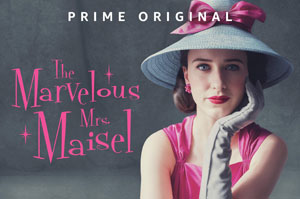Saying a TV show spends a lot of money might be an odd way to extoll praise, but that’s what pushes “The Marvelous Mrs. Maisel” from great into the stratosphere of “I might cry if it gets canceled before the story is over” in its sophomore year.
Season 2, now available on Amazon Prime, takes various members of the Weissmans and Maisels to Paris, their annual summer vacation in the Catskills Mountains, comedy clubs around the Northeast, and of course the familiar haunts of New York’s Upper West Side.
While Daniel Palladino’s excesses sometimes lightly intrude, Amy Sherman-Palladino has completed her reverse George Lucas: She has learned from missteps (in Seasons 5–6 and 8 of “Gilmore Girls”), and – combined with a budget that matches her ambitions – strikes a delightful mix of character growth and spectacle. The Palladinos say something about being a female comedian in 1959 without making us stop and say “They’re saying something about being a female comedian in 1959.”
(Spoilers follow.)

“The Marvelous Mrs. Maisel” Season 2 (2018)
Amazon Prime, 10 episodes
Creator: Amy-Sherman Palladino
Stars: Rachel Brosnahan, Alex Borstein, Tony Shalhoub
The Palladinos’ truest ensemble
Despite the title, “Maisel” is the truest ensemble show of the Palladinos’ Big Three. Watch any given scene, and Tony Shalhoub’s Abe Weissman is a caricature, albeit a delightful one, of a Jewish Columbia mathematics professor. But I know him much better after these 10 episodes.
The way he fails to notice that wife Rose (Marin Hinkle) has moved to Paris is over-the-top silly, but the fact that he is more cognizant of her needs after that makes him a genuine person … granted, one with quirks such as his morning workout jumper and his extreme vetting of Benjamin (Zachary Levi) as Midge’s (Rachel Brosnahan) potential suitor.
Michael Zegen’s Joel Maisel also gets a tasty arc as he pushes past the inferiority complex that caused him to break up with Midge and, through smarts and elbow grease, gets his father Moishe’s (Kevin Pollak) garment business back on track.
Joel and Midge are a striking portrayal of two people who love each other but aren’t together. The reason, as Joel admits in the Season 2 premiere, is that he is too insecure to accept being a subject of Midge’s standup material.
While part of me wants Joel to say “Screw it; I’ll learn to deal with it,” Zegen plays Joel’s situation with enough painful honesty that I buy it. Also, I remind myself, this is 1959. There’s a lot of societal pressure to not play second fiddle to your wife, and Joel is only human.
Big budget helps create 1959
Actually, I don’t have to remind myself this is 1959, because everything about “Maisel” (except the wonderfully anachronistic closing-credits needle drops of small pop gems from the 1970s and ’80s) reminds us. This is where the big budget comes in. At the Catskills, bowling-alley workers manually set up the pins. At the hospital, Imogen’s (Bailey De Young) baby is stored in a drawer next to her bed. And then there’s Midge’s treatment in her chosen profession.

In the season finale, she’s doing an innocuous bit about pregnancy when she gets pulled off stage by the club owner. Midge’s style is to observe reality with a little less self-censorship than the day’s decorum demands, while being lightly funny and personable on stage.
Her material is stuff that pops into her mind naturally, as it does for Amy and her writers, and for Lorelai and Michelle in her previous shows. This is enough to be controversial in those days – at least to one club owner – but there’s also an undercurrent that male comics don’t want Midge infringing on their territory. As wordy as Amy’s scripts are, the audience isn’t lectured to; we’re just shown the situation.
And with good balance. Lenny Bruce (Luke Kirby), based on the real-life comedian, continues to be a big supporter of Midge’s, and we see his career as an edgy comic isn’t all sunshine and roses either. Later, the singer Shy Baldwin (Leroy McClain) offers Midge an opening slot on a tour, something that could be her big break in Season 3.
Sophie Lennon (Jane Lynch) is an example of a hugely successful female comic, but only because she wears a fat suit and recites the same audience-pleasing material (“Put that on your plate!”).
It’s tough out there for mid-century women
“Maisel” shows that it’s tough for a mid-century woman, but it loves men, too – as witnessed by the robust arcs given to Abe and Joel and even Lenny. Luke and Christopher look like sketchily drawn place-holders by comparison. And honestly, Midge’s work-relationship balance struggles feel more genuine than Lorelai’s, because we see the unchallenged strictures of 1959 New York City Jewish culture.
Lorelai’s issues seem self-imposed by comparison. Why doesn’t it work out for Lorelia with Christopher? Because she doesn’t want it to. Why doesn’t it work out for Midge with Joel? Because there’s an irreconcilable career-family conflict.
“Maisel” also loves its woman who is regularly mistaken for a man: Alex Borstein’s Susie. Borstein navigates the over-the-top material (she’s targeted by hitmen of an industry rival) and the more down-to-earth material (she sleeps on a bench in the club downstairs to avoid the hitmen).
A perfect middle ground comes when she infiltrates the Catskills resort simply by carrying around a plunger; this leads to free meals and a place to sleep. (Although the search party looking for Susie is arguably a bridge too far.) And no one punctuates a scene – and sells the bigger twists, like when Sophie wants to bring her aboard as manager — with a “What the f***!” like Borstein.
A musical sensibility
Even at its low points – the repeated door-buzzer joke at Bell Labs or the TV crew being flabbergasted by Susie and Midge entering their studio – “Maisel” Season 2 plays like the best community theater comedy you’ve seen. And while it’s not quite a musical, sometimes I wish it was.
The Palladinos don’t have a built-in excuse of a ballet studio like on “Bunheads,” but when the resort wraps its summer with a dance that’s choreographed to the gills, it’s earned.
At its best, well, “The Marvelous Mrs. Maisel” is my favorite TV show of 2018. When it goes to Paris, it’s in Paris (I’m staring you down, “Gilmore Girls” Season 7). When it goes to the Catskills, it’s in the Catskills. (If the production didn’t actually go to these places, then I’m even more impressed.)
And when it’s in 1959 … somehow … it’s in 1959, with comedy-scene sexism intact, but never to the point that it snuffs out the exciting possibilities around the bend.
Click here to visit our “Gilmore Girls,” “Bunheads” and “Marvelous Mrs. Maisel” Zone.

